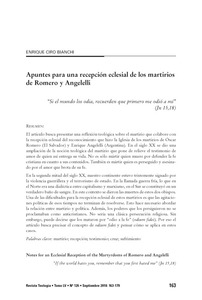Por favor, use este identificador para citar o enlazar este ítem:
https://repositorio.uca.edu.ar/handle/123456789/6808| Título: | Apuntes para una recepción eclesial de los martirios de Romero y Angelelli Notes for an ecclesial reception of the martyrdoms of Romero and Angelelli |
Autor: | Bianchi, Enrique Ciro | Palabras clave: | Angelelli, Enrique, 1923-1976; Romero, Óscar A. (Óscar Arnulfo), Saint, 1917-1980; MARTIRIO; POLITICA; IGLESIA CATOLICA | Fecha de publicación: | 2018 | Editorial: | Universidad Católica Argentina. Facultad de Teología | Cita: | BIANCHI, Enrique C., Apuntes para una recepción eclesial de los martirios de Romero y Angelelli [en línea]. Teología, 126 (2018). Disponible en: https://repositorio.uca.edu.ar/handle/123456789/6808 | Resumen: | Resumen: El artículo busca presentar una reflexión teológica sobre el martirio que colabore con la recepción eclesial del reconocimiento que hizo la Iglesia de los martirios de Óscar Romero (El Salvador) y Enrique Angelelli (Argentina). En el siglo XX se dio una ampliación de la noción teológica del martirio que pone de relieve el testimonio de amor de quien así entrega su vida. No es sólo mártir quien muere por defender la fe cristiana en cuanto a sus contenidos. También es mártir quien es perseguido y asesinado por el amor que brota de su fe. En la segunda mitad del siglo XX, nuestro continente estuvo tristemente signado por la violencia guerrillera y el terrorismo de estado. En la llamada guerra fría, lo que en el Norte era una dialéctica entre capitalismo y marxismo, en el Sur se constituyó en un verdadero baño de sangre. En este contexto se dieron las muertes de estos dos obispos. Una de las dificultades para la recepción eclesial de estos martirios es que las agitaciones políticas de esos tiempos no terminan de resolverse. Esto hace necesario abordar la relación entre martirio y política. Además, los poderes que los persiguieron no se proclamaban como anticristianos. No sería una clásica persecución religiosa. Sin embargo, puede decirse que los mataron por “odio a la fe” (odium fidei). Por eso el artículo busca precisar el concepto de odium fidei y pensar cómo se aplica en estos casos. Abstract: The article seeks to present a theological reflection on martyrdom that collaborates with the ecclesial reception of the Church's recognition of the martyrdoms of Óscar Romero (El Salvador) and Enrique Angelelli (Argentina). In the twentieth century there was an extension of the theological notion of martyrdom that highlights the testimony of love of those who thus give their lives. It is not only a martyr who dies to defend the Christian faith in terms of its contents. It is also a martyr who is persecuted and killed for the love that springs from his faith. In the second half of the 20th century, our continent was sadly marked by guerrilla violence and state terrorism. In the so-called cold war, what in the North was a dialectic between capitalism and Marxism, in the South it became a real bloodbath. In this context, the deaths of these two bishops occurred. One of the difficulties for the ecclesial reception of these martyrdoms is that the political upheavals of those times are not resolved. This makes it necessary to address the relationship between martyrdom and politics. In addition, the powers that persecuted them were not proclaimed as anti-Christians. It would not be a classic religious persecution. However, it can be said that they were killed for "hatred of the faith" (odium fidei). That is why the article seeks to clarify the concept of odium fidei and to think how it is applied in these cases. |
URI: | https://repositorio.uca.edu.ar/handle/123456789/6808 | ISSN: | 0328-1396 | Disciplina: | TEOLOGIA | Derechos: | Acceso Abierto | Fuente: | Teología, Tomo LV, nº 126, 2018 ISSN 0328-1396 |
| Aparece en las colecciones: | TEO - 2018 Tomo LV nro. 126 |
Ficheros en este ítem:
| Fichero | Descripción | Tamaño | Formato | |
|---|---|---|---|---|
| 1507-5292-1-PB.pdf | 230,83 kB | Adobe PDF |  Visualizar/Abrir |
Visualizaciones de página(s)
180
comprobado en 30-abr-2024
Descarga(s)
194
comprobado en 30-abr-2024
Google ScholarTM
Ver en Google Scholar
Este ítem está sujeto a una Licencia Creative Commons

